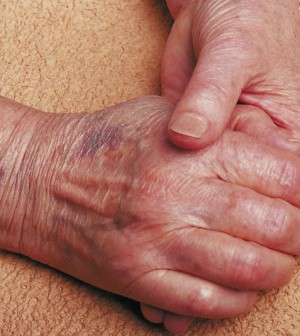- Could Your Grocery Store Meat Be Causing Recurring UTIs?
- Are You Making This Expensive Thermostat Error This Winter?
- Recognizing the Signs of Hypothyroidism
- 10 Strategies to Overcome Insomnia
- Could Artificial Sweeteners Be Aging the Brain Faster?
- Techniques for Soothing Your Nervous System
- Does the Water in Your House Smell Funny? Here’s Why
- Can a Daily Dose of Apple Cider Vinegar Actually Aid Weight Loss?
- 6 Health Beverages That Can Actually Spike Your Blood Sugar
- Treatment Options for Social Anxiety Disorder
Skin Test for Alzheimer’s, Parkinson’s Shows Early Promise


A small, early study hints that a skin test may someday be able to help diagnose people with Alzheimer’s and Parkinson’s diseases.
Researchers found that skin biopsies can reveal elevated levels of abnormal proteins associated with the two disorders.
The study is being released ahead of its presentation in April at the annual meeting of the American Academy of Neurology (AAN) in Washington, D.C.
As it stands now, a definite diagnosis of Alzheimer’s disease in a living person has not been possible, so the illness is often “unrecognized until after the disease has progressed,” Dr. Ildefonso Rodriguez-Leyva, of the Central Hospital at the University of San Luis Potosi in Mexico, explained in an academy news release.
“We hypothesized that since skin has the same origin as brain tissue while in the embryo, that they might also show the same abnormal proteins,” he said. “This new test offers a potential biomarker that may allow doctors to identify and diagnose these diseases earlier on.”
The researchers took skin biopsies from 20 Alzheimer’s disease patients, 16 Parkinson’s disease patients, 17 patients with non-Alzheimer’s dementia, and 12 healthy people.
Compared to healthy people and those with non-Alzheimer’s dementia, the Alzheimer’s and Parkinson’s patients had seven times higher levels of a protein called tau. The researchers also found that Parkinson’s patients had eight times higher levels of a protein called alpha-synuclein, compared with healthy people.
“More research is needed to confirm these results, but the findings are exciting because we could potentially begin to use skin biopsies from living patients to study and learn more about these diseases,” Rodriguez-Leyva said. “This also means tissue will be much more readily available for scientists to study.”
“This procedure could be used to study not only Alzheimer’s and Parkinson’s, but also other neurodegenerative diseases,” he theorized.
Two experts said such a test would be welcome, but it’s too early to confirm the usefulness of this skin-based method. Experts also note that studies presented at medical meetings are typically considered preliminary until published in a peer-reviewed journal.
“Similar claims [for diagnostic tests] have been made for a decade or more, but none have held up to scrutiny or independent replication,” said Dr. Samuel Gandy, associate director of the Alzheimer’s Disease Research Center at Mount Sinai, in New York City.
He said he would “reserve judgment to see whether any totally independent group can reproduce the results.”
Dr. Marc Gordon is chief of neurology at Zucker Hillside Hospital in Glen Oaks, N.Y. He agreed that the test might be a real breakthrough, but only “if these findings can be independently replicated.”
According to the AAN, about 5.4 million Americans have Alzheimer’s disease and 1 million have Parkinson’s disease.
More information
The U.S. National Institute on Aging has more about Alzheimer’s disease.
Source: HealthDay
Copyright © 2026 HealthDay. All rights reserved.










